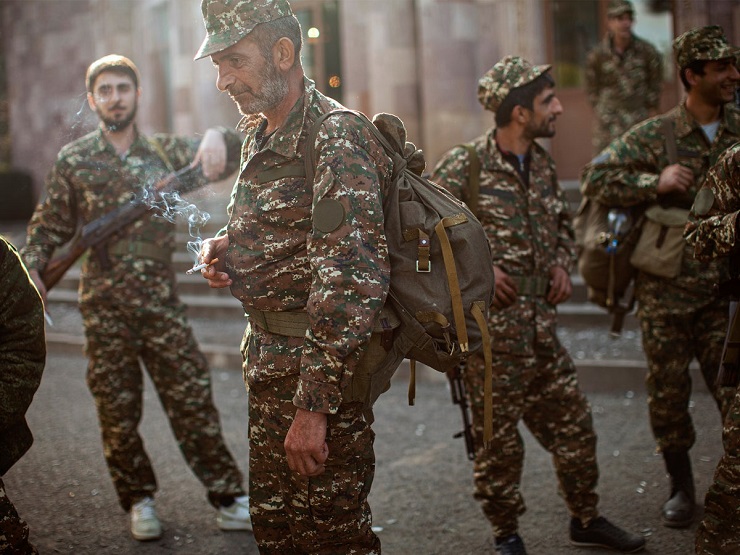The recently ceased fighting in Nagorno-Karabakh region between Azerbaijan and Armenia has opened too many cracks that a number of external players, especially the US, are looking to exploit to their advantage. For the US, military tensions and wide-spread instability and war close to Russia’s southern regions and Iran would directly help it do both these countries significant damage. A spill-over of this conflict into Iran would largely undo the benefits Iran is trying to reap through its strategic and economic alliance with China. Iran, instead, would be plagued with a kind of war that would open cracks for militant-jihadi groups to seep in, allowing its rival states to destabilize it from within. While Turkey’s standing in the conflict is largely shaped by Erdogan’s ‘neo-Ottomanism’, for both Iran and Russia, the primary factor remains stability on their borders. Iran has important political and economic relations with both countries that could get disrupted if the conflict continues. Besides, Transcaucasia borders the Caspian, which is a highly strategic region for Iran. And Iran is deeply apprehensive that extra-regional powers hostile to it are waiting in the wings to exploit the instability.
For the US, therefore, the situation presents an opportunity against Iran and Russia. Its involvement in the conflict will naturally be guided by this very cardinal objective; hence, its push for placing a Western ‘peace-keeping’ military force in the region.
The US National Security Adviser Robert O’Brien recently said that he was working with Scandinavian governments to put together a potential peacekeeping mission. Obviously, the US is not really looking to use the ‘Minsk Group’ to facilitate conflict resolution, or even prepared to involve Moscow in the plan. It is aiming at placing external forces in the region. However, the US’ move away from the ‘Minsk Group’ could be a blessing in disguise for Russia, allowing it to liaise with other states, such as Iran, to find a durable situation. It is but natural for both Russia and Iran to desist any external force deployed in the region to serve US interests.
The same holds true for Turkey as well. While its interests do not seem to converge naturally with Iran and Russia, they’re diametrically opposed to that of the US. “We now have the Turks, who have stepped in and provided resources to Azerbaijan, increasing the risk, increasing the firepower that’s taking place in this historic fight,” Pompeo said in an interview with broadcaster WSB Atlanta.
In this context, it is but natural for Turkey to ally with Iran and Russia to resolve the issue. It has been rebuffed by the NATO for its adventurism, increasing the level of their mutual polarization.
Turkey and Iran, who have been able to redefine their relations in the wake of The Abraham Accords, do have a significant level of convergence to launch a peace process that can resolve the conflict without an extra-regional intervention. Iran’s recently announced peace initiative is accordingly pushing for the same. While Iran’s peace plan has already received a tacit approval from Moscow, this plan doesn’t counter Turkish interests at all. On the contrary, it tends to address them in a significant way.
On top of it all is the fact that Iran’s plan is a regionally oriented solution of the conflict and will potentially prevent extra-regional powers to intervene and manipulate the crisis to their advantage. Most importantly, it will prevent the growing regional polarization, which, if it happens, will directly impact the regional countries only. France and the US, the other co-chairs of the ‘Minsk Group’ will not bear the brunt. As Iran’s foreign minister Zarif put it, “Iran believes that the countries in the region will bear the brunt of this war, and these countries can have the greatest impact on ending the war.”
Iranian deputy foreign minister, Abbas Araghchi’s pungent remarks about the ‘Minsk Group’ tell the whole logic of this initiative. To quote him, “Some of the member countries of this group are not even in the region and their inefficiency has been proven” as their repeated requests for ceasefire have not been able to hold peace. “The foreign players of the Minsk Group – France and the US – are far away from the region and are disconnected from it not only politically, but emotionally and ethically, while having no real desire to establish peace in Karabakh”, he added.
Therefore, Iran, unlike the US, is not looking for a mere ceasefire, or any other form of temporary solution through the so-called ‘peace-keeping’ force. Such a force can only freeze the conflict, leaving it unresolved. Its emphasis on finding a permanent and durable solution, therefore, speaks well to both Russia and Turkey. As Zarif said, our plan is not only “seeking a temporary ceasefire but also a move towards resolving the conflicts based on a framework that begins with the declaration of commitment of both sides to a set of principles and then it continues with measures.”
For Russia, a permanent resolution will close a crack that no external player can manipulate. For Turkey, a partly Turkish-brokered resolution will add to its external power potential and stamp its ‘neo-Ottoman’ credentials. For all of these countries, following this plan and building a peace process on it will minimize both the US involvement and the risk of further polarization and a spill over of the conflict into Russia or Iran.
Salman Rafi Sheikh, research-analyst of International Relations and Pakistan’s foreign and domestic affairs, exclusively for the online magazine “New Eastern Outlook”.

